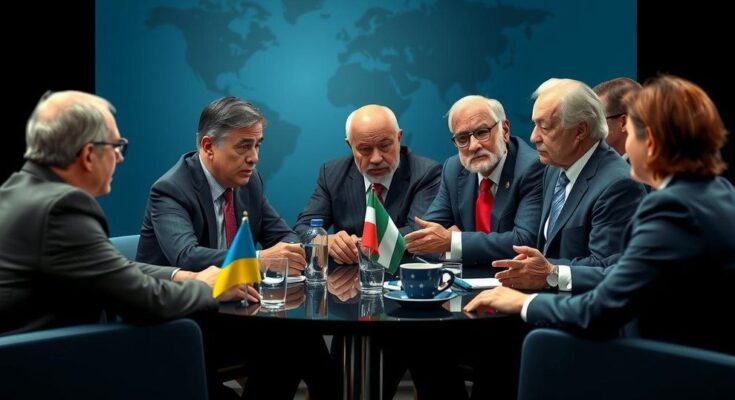The G20 summit in Brazil addresses critical issues including the Middle East and Ukraine conflicts, climate change, and the implications of Donald Trump’s electoral win. Brazilian President Lula emphasizes poverty alleviation and taxation of the wealthy. Amid security concerns, cooperation on climate finance for developing nations remains a significant challenge, prompting calls for unified action.
Leaders of the G20 began arriving in Brazil for a pivotal summit aimed at addressing pressing global issues, including the escalated conflicts in the Middle East and Ukraine, as well as climate change. The summit, held in Rio de Janeiro on Monday and Tuesday, takes place in a complex geopolitical context, shortly after Donald Trump’s electoral win in the United States. Brazilian President Luiz Inácio Lula da Silva initiated proceedings at the opening ceremony held at the Museum of Modern Art in Rio. United States President Joe Biden is participating in his last summit amidst challenges to his influence, particularly from Chinese President Xi Jinping, who is perceived as the dominant figure at this event. President Lula is prioritizing discussions on topics near to his heart, such as alleviating hunger, addressing climate change, and advocating for taxation of the affluent. The ongoing wars that have divided G20 members significantly will be a key focus of the discussions. According to a Brazilian foreign ministry source, some nations are seeking to amend a draft communiqué regarding the wars and climate. Biden’s recent decision to permit Ukraine to deploy long-range US missiles against Russian targets may influence European allies to reassess their policies as well. G20 leaders face mounting pressure to revive the stalled UN climate negotiations in Azerbaijan, particularly regarding financial aid to developing nations grappling with climate impacts. UN Secretary-General Antonio Guterres has urged G20 nations, contributing to 80% of global emissions, to exhibit leadership to achieve meaningful agreements. The backdrop of this summit is heightened security, following recent threats against Brazil’s institutions. The summit continues a diplomatic tour for President Biden, who is eager to reinforce his climate legacy before his presidency concludes. In a significant moment, Lula emphasized the primacy of addressing poverty amid global conflicts: “Because if not, we will not discuss other things which are more important for people that are not at war, who are poor people and invisible to the world.” The summit also features Lula’s initiatives against hunger and poverty, alongside discussions on increased taxation on billionaires. There are indications of reluctance from Argentina regarding some proposals, though the Brazilian foreign ministry expressed optimism about reaching a consensus despite such obstacles.
The G20 summit represents a crucial gathering of leaders from the world’s major economies, aimed at discussing and resolving significant global challenges. The event occurs against the backdrop of ongoing geopolitical tensions fueled by conflicts in the Middle East and Ukraine, which have exacerbated divisions among member countries. Additionally, the summit seeks to address climate change, particularly in light of stalled negotiations for funding to assist developing nations. Brazilian President Lula’s agenda emphasizes social equity and a renewed focus on poverty alleviation amidst the complexities of international dialogues about warfare and environmental responsibility.
In summary, the G20 summit in Brazil underscores a critical moment for global leadership as leaders confront pressing conflicts and climate challenges. While President Biden’s participation is marked by an authoritative transition, Lula’s focus on poverty and hunger signifies a commitment to address immediate human needs. The outcomes of this meeting will hinge on leaders’ abilities to reconcile differing national interests and collaborate on coherent strategies for both climate action and conflict resolution.
Original Source: www.france24.com




